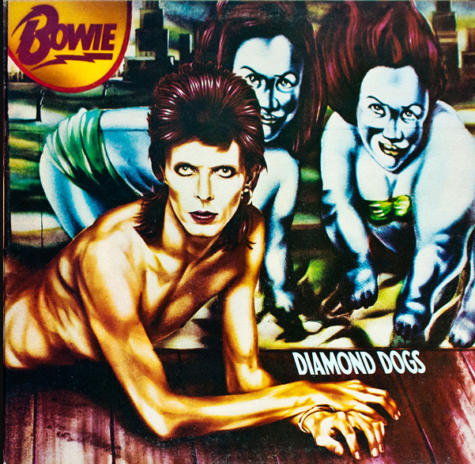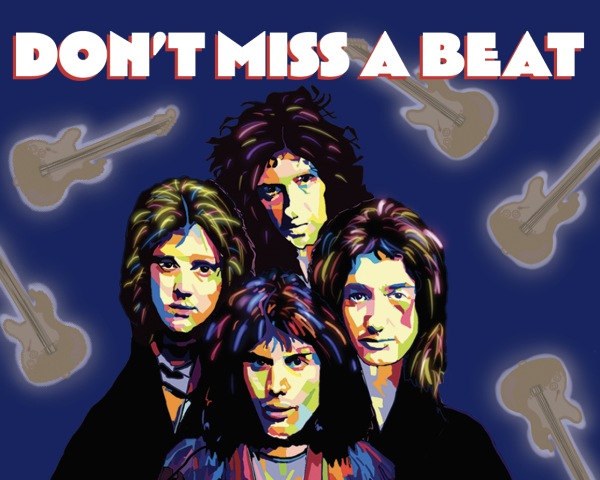Unheard Gems: David Bowie’s Diamond Dogs
4 MIN READ
Diamond Dogs was David Bowie’s eighth studio album. Released in May 1974, Diamond Dogs is the beginning of David Bowie’s journey into different soundscapes and proves to be one of the first major changes his sound would undergo.
Here, he ditches his old band, the Spiders From Mars, and begins to move in a direction more oriented towards Soul music, already making a big splash in the United States. Initially, Bowie wanted to make a concept album based around George Orwell’s Novel “Nineteen Eighty-Four”, but his estate wouldn’t allow it. Despite this, Bowie kept many songs with the dystopian theme for this album, which also serve as an allegory to the political unrest happening in the Nixon administration at the time.
The album begins with a spoken word intro called “Future Legend,” which Bowie details a dystopian future in with suffering and death in the aptly named Hunger City. As Bowie describes the scene with lines such as “The last few corpses writhing on the slimy thoroughfare,” sparse synths fade in, building it up to the climax. Finally, Bowie yelps “This ain’t Rock and Roll, this is genocide!” and you hear an audience cheering. This build up sounds more like the beginning of a concert or opera than an album, but it is a perfect setup for an album that covers such a wide range of styles.
The saga continues, with the trashy glam rock feel of the title track, the album takes a turn into soul music with the nearly 9 minute long “Sweet Thing/Candidate/Sweet Thing (Reprise),” which shows Bowie experimenting with the limits of his new sound. As with many Bowie songs, it builds into a descending piano riff. Bowie growls lyrics of love and lust when suddenly, his voice rises, and he begins to croon mournfully about being “sad and lonely.” Even as the themes and voice change, Bowie’s voice sounds remarkably clear, as if he’s living these experiences right before our ears. The tone shifts during the second part, growing creepier, whilst Bowie sings random lines about various things incoherently. It should be noted that this song utilizes Bowie’s “cut up” technique, where he cuts up potential lines on pieces of paper, mixes them up, and puts them together at random. Bowie used the technique because he believed it breathed new life into old ideas, calling it an “ingredients list.” On paper, Bowie’s lyrics make no sense. However, when listening to his songs, the lyrics immerse you completely. The song delves back into its original melancholy state during the 3rd and final part, dubbed the “reprise”.
After the reprise fizzles out, the album reverts back to a sleazy glam rock tune that most everybody knows “Rebel Rebel”, which is one of Bowie’s best known songs. Side 1 has a creative arc pretty much unparalleled by any other album. Starting with his “Nineteen Eighty-Four” theme, segueing into his coveted Glam Rock sound, going into his new soul direction, and finally defaulting back to glam. In a way, side 1 of Diamond Dogs is just like throwing a ball up in the air, what goes up must come down.
Side 2 begins with much more of the soul influence we see earlier. The song “Rock and Roll With Me” is a nostalgic throwback to 1950’s era R&B tunes. The rest of the album is a nod to the Nineteen Eighty-Four concept album Bowie so badly wanted to do. “We Are the Dead” is both a nod to one of the most famous lines in the book as well as Bowie’s take on the burgeoning Progressive Rock movement. The next track, the appropriately named “1984” utilizes short wah-wah guitars, strings and a strong vocal to create a skeleton of what would later become disco music. It’s a fascinating foreshadowing of what was to come in the music world. The last track, “Big Brother”, serves as the grand conclusion to it all. Distorted guitars from Bowie’s glam rock past, a slow tempo and deep vocals from his new soul sound, with strings predicting disco and keys indicative of Progressive Rock, and the Nineteen Eighty-Four theme to top it all off, it is truly the perfect end to an almost perfect album. Bowie’s life is also intertwined into the song, as he asks if “We should power our noses?”, alluding to the massive amounts of cocaine he was using at the time. The outro of the album, the brief “Chant of the Ever Circling Skeletal Family” is a brief chant, finally dissolving into a repeating “bruh-bruh-bruh”, as though the record is repeating, fading away as side 2 ends.
Overall, the album flows between styles effortlessly, shifting from glam rock to soul, whilst acknowledging other genres also on the come up in 1974. The lyrics are intriguing and thought provoking, despite how many of them were created.
The audio quality of the album could definitely be better, as the highs tend to be brash and overbearing in many releases. The 2017 Vinyl Remaster, however, does a good job keeping the record tonally balanced, with the low end and high end at a somewhat even level, without compressing it to the point of losing the dynamic range of the original. The new release also does a good job at downplaying the multiple issues plaguing the original master tape, not well looked after since the day they left the studio.
Diamond Dogs was well received, reaching #5 on the Billboard 200 and going gold (500,000 copies sold) two months later, but as a whole failed to stay in the minds of music fans to the point of becoming the classic album that it’s predecessors became. While Ziggy Stardust and Aladdin Sane are surely classic albums that deserved to be remembered for their contributions to popular music, I argue that Diamond Dogs should also be included because it is a perfect snapshot of it’s time, fusing so many musical genres, whilst alluding to the political unrest happening in the U.S. at the time.

Theo's passion for music and writing is what drove him to join C Magazine. His favorite part of being on the staff is getting to meet and collaborate...










![UNSUNG HEROES — Fred Korematsu, Karen Korematsu and Aiko Herzig-Yoshinaga are awarded the Asian American Justice Medal to recognize their fight for justice following the incarceration of Japanese Americans during World War II. In addition, scientists Shuji Nakamura, David Ho, Tsoo Wang, Mani Menon and Chih-Tang “Tom” Sah receive the Asian American Pioneer Award. "[As a scientist,] it is crucially important to be able to communicate your work and your discoveries to [not only] other scientists, but also to the general public," Ho said. Photo by Talia Boneh](https://cmagazine.org/wp-content/uploads/2025/07/useee-600x400.jpg)
